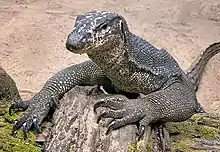Palawan water monitor
The Palawan water monitor (Varanus palawanensis) is a quite large species of monitor lizard in the family Varanidae. The species is endemic to the Philippines.[1]
| Palawan water monitor | |
|---|---|
 | |
| Scientific classification | |
| Domain: | Eukaryota |
| Kingdom: | Animalia |
| Phylum: | Chordata |
| Class: | Reptilia |
| Order: | Squamata |
| Family: | Varanidae |
| Genus: | Varanus |
| Subgenus: | Soterosaurus |
| Species: | V. palawanensis |
| Binomial name | |
| Varanus palawanensis | |
Description
Varanus palawanensis can reach total length of (including tail) 2 metres (6,6 ft).[2]
The best studied water monitor population of the Philippines is that of Calauit ( Gaulke 1989 ), a small islet belonging to the Calamian Island Group at the north-easterly margin of Palawan Province. Gaulke ( 1989 ) provided morphological data for 167 specimens . The longest specimen had a total length of 1880 mm with parts of its tail missing. The smallest specimen measured only 390 mm from the tip of the tail to the tip of the snout. Latter specimen had a snout-vent length of 14 cm, while the largest measured 78.8 cm . The mean snout-vent length was 54.77 cm.[2]
Taxonomy
Varanus palawanensis has enough differences to be considered a distinct species[3] from the closely related V. salvator (water monitor), V. marmoratus (marbled water monitor), and V. rasmusseni. V. palawanensis belongs to the subgenus Soterosaurus with these three species and several other species.
Distribution
Varanus palawanensis is found on the islands of Palawan, Busuanga, Calauit, Balabac, and Sibutu.[1]
References
- Science Daily.com
- "Varanus palawanensis".
- Wildlife extra.com. Archived 2011-10-02 at the Wayback Machine
External links
- Koch, André; Gaulke, Maren; Böhme, Wolfgang [in German] (2010). "Unravelling the underestimated diversity of Philippine water monitor lizards (Squamata: Varanus salvator complex), with the description of two new species and a new subspecies" (PDF). Zootaxa. 2446: 1–54. doi:10.11646/zootaxa.2446.1.1. (Varanus palawanensis, new species, p. 33).